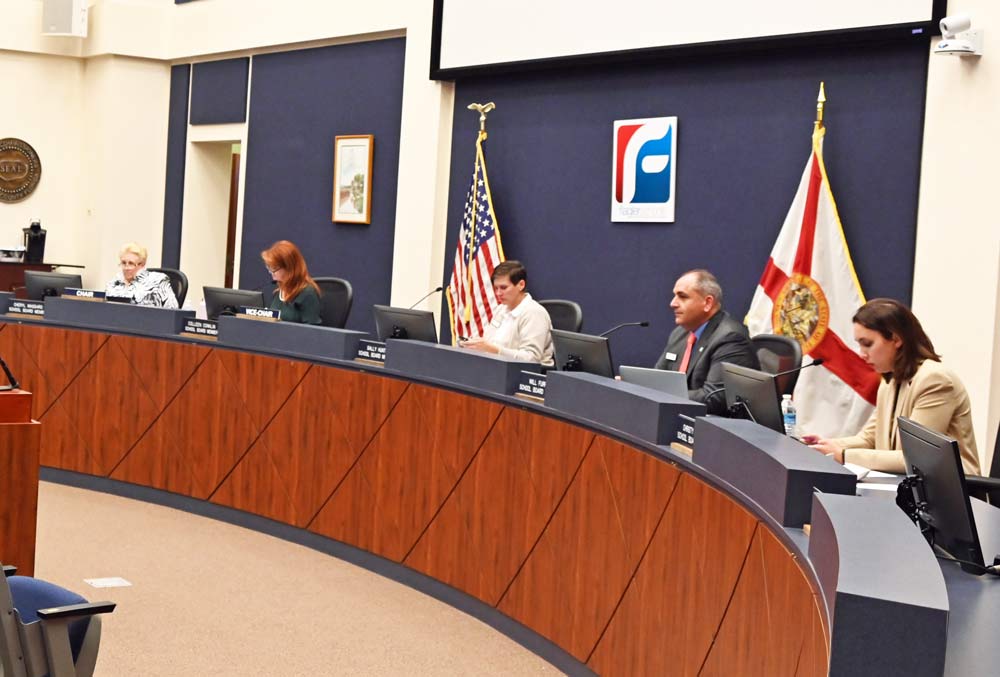
Three Flagler County School Board members have submitted nine questions to two attorneys the board hired for at least $5,000 to examine how it could fire Board Attorney Kristy Gavin without getting sued. The board members wrote the questions and circulated them outside of a public meeting. The questions had not been disclosed publicly until this article.
Three board members–Sally Hunt, Christy Chong and Will Furry–were pushing to fire Gavin starting last month, at least until Bord Chair Cheryl Massaro suggested that Gavin could be shifted within the administration and become a staff attorney, answering to the superintendent, rather than to the board.
The board would then hire its own, separate attorney. Board members were receptive to the idea at a meeting last week, especially as it would pre-empt the complications, costs and potential litigation of an unamicable divorce.
But it was the same meeting where the board also agreed to follow Furry’s proposal to hire Shutts and Bowen, one of the state’s largest law firms, to study Gavin’s employment contract and advise the board on how to get rid of her. She has been the board’s attorney for 17 years, in effect also–if not mostly–serving as the staff attorney all those years. (See: “School Board Trio Will Hire an Attorney to Help Them Fire Board’s Attorney of 17 Years.”)
Furry asked board members to send him questions they want the Shutts attorneys to answer, and to do so by way of Lorraine Thompson, a paralegal and the administrative assistant to Gavin and the school board, to avoid getting Gavin involved in any way.
The three board members who sent in questions were Colleen Conklin, Massaro and Chong. Thompson scrubbed the questions of their authorships, collated them into a single-page Word document, and sent them to Furry, as well as to the four other board members. Furry sent them to the outside attorneys. Furry, who the board delegated to have direct contact with the outside attorneys, almost certainly asked his own questions. He did not provide them for public examination.
The legality of the procedure is questionable: under Florida’s sunshine law, no elected board may conduct any collective business, anonymously or not, that results in actions that will affect board business, as the questions and answers surely will. The sunshine law’s open-meetings provision is specific about the deliberative process being in the public eye. In this case, it was not.
But Gavin could not raise objections, since, as the only attorney at the board, she had been sidelined from discussions about firing her, and this particular board has been less than scrupulous about abiding to the open-meetings law: it used to routinely huddle after evening board meetings to discuss how the meeting went, and last month it was caught in a closed-door huddle after the superintendent’s press conference on the segregated assemblies at Bunnell Elementary. It was partly the dynamics behind that day that led Hunt and Chong subsequently to want Gavin’s contract reconsidered, starting the process toward firing her.
The board members would have been on the safer side of the law by sticking to having direct, one-on-one consultations with the outside attorneys. That would not break sunshine. But the attorneys have limited such interactions to a maximum of three hours before they bill between $515 and $570 an hour for additional work.
FlaglerLive obtained the exchanges between board members and the administration leading to the list of submitted questions. Gavin usually handles those public record requests. In this case, the requests were handled by Jennifer Gimbel and Thompson. It took several insistent requests and clarifications to obtain the full records, or what appears to be the full records.
The questions were as follows, as each board member submitted them, with FlaglerLive’s explanatory italics added where necessary in brackets.
Cheryl Massaro:
1. Pertaining to Flagler Schools: School Board Attorney Employment Agreement: A. Number 6: Termination: In layman’s terms please define “Just Cause”: and how it relates to:
1 Dereliction of Duty
2 Failure to report to work
3 Misconduct in Office
4 Violation of a Criminal Law
[Massaro is referring to Gavin’s contract’s language under the termination clause, which states that she “shall be subject to discharge only for just cause. Just cause shall be defined as dereliction of duty, failure to report to work, misconduct in office or violation of criminal law.” To date, there has been no evidence, presented or alleged, of any such behavior.]
2. If a School Board member is aware of a SBA [School Board Attorney] violation of this contract and does not report the alleged misconduct to proper authorities, are they liable in any way?
[Massaro is making a reference to a statement Hunt made at a workshop, zeroing in on the word “misconduct” in Gavin’s contract, and prompting Massaro to ask her: “If there is misconduct, and any of these board members were aware of this conduct, it would have needed to be reported to the Florida Bar.” Hunt said she would “clarify,” but she did not, choosing to be more cryptic: “I would not expect for you to trust my thoughts on this any more than I should should trust your thoughts on this,” Hunt told Massaro, suggesting that she (Hunt) knew something others do not, but not saying what it is.]
Read Related Also: Israel says it will cut 'the umbilical cord' with Gaza to create 'a new security reality' and block ALL crossings after annihilating Hamas in ground invasion
3. If “Just Cause” by the SBA is not articulated by the School Board, and the School Board terminates their contract, how do we avoid a Wrongful Termination Lawsuit?
4. In the event an Administrative Law Judge is necessary, to settle this contract, who pays for their services?
[The Division of Administrative Services itself answers that question on its website without charging $570 an hour: “The Division is 100% trust funded. Some state entities must pay filing fees or other fees to utilize the division’s hearing services. These funds are derived from assessments paid by insurance carriers writing workers’ compensation insurance and self-insurers into the Workers’ Compensation Administration Trust Fund.”
Beyond the division’s own costs, the law requires the judge to award legal costs to the prevailing party, but only if the other party is determined to have participated in the proceedings improperly, which the law defines as “to harass or to cause unnecessary delay or for frivolous purpose or to needlessly increase the cost of litigation.”]
5. In your professional opinion, what is the best way to terminate this contact with limited liability to the School Board?
6. The current Contract expires on June 30, 2025. Should the School Board wish to “Buy Out” this contract, how would you recommend we proceed?
Christy Chong:
As a public employer what are the legal limitations of severance and any negotiations leading to a settlement?
[The contract specifies that no severance is due when the attorney is fired for just cause. But the attorney may challenge a just-cause firing through an Administrative Law Judge. If the judge finds that no just cause existed, the attorney would have to be paid 12 weeks’ base salary. In Gavin’s case, that would be around $31,000.]
How can we come to a mutual agreement on our attorney’s contract due to lack of confidence and trust with the board?
[The question bears its own answer in the word “mutual,” though that would depend on Gavin.]
Colleen Conklin:
Are we required to buy out Mrs. Gavin’s contract? If so what’s the entire cost? Do we need to include the remainder for retirement
and benefits?
[Gavin’s base salary this year is $135,000. Retirement ($46,592), Social Security ($8,304), Medicare ($1,942), health insurance ($7,196) and income protection ($385) add $64,419 a year in compensation costs, for a total compensation package of $199,419.]
The one-page-document sent to Furry without the board members’ names lists 10 questions, but one of them is a duplicate. Assuming no proxy communications are taking place out of sunshine, the board is to discuss Gavin’s fate again at its 1 p.m. workshop scheduled for Oct. 17, and possibly take action at its evening meeting that day.










